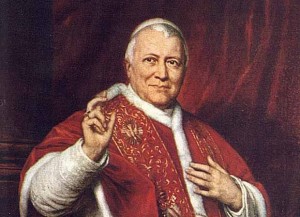 The idea of infallibility doesn’t strike me as preposterous. Faint praise, right? But divine revelation does seem to presuppose it. If it’s possible that those who received a revelation from God misunderstood what they heard or incorrectly communicated it to others, then the revelation would be unreliable. If you accept the idea that God speaks, it’s no stretch of credulity to imagine that God also protects the integrity of the message. Catholics believe that God inspired the biblical authors and guides the Church in the interpretation and application of the deposit of faith. The latter is no more incredible than the former.
The idea of infallibility doesn’t strike me as preposterous. Faint praise, right? But divine revelation does seem to presuppose it. If it’s possible that those who received a revelation from God misunderstood what they heard or incorrectly communicated it to others, then the revelation would be unreliable. If you accept the idea that God speaks, it’s no stretch of credulity to imagine that God also protects the integrity of the message. Catholics believe that God inspired the biblical authors and guides the Church in the interpretation and application of the deposit of faith. The latter is no more incredible than the former.
That being said, the idea of infallibility remains, shall I say, underdeveloped. To enjoy the charism of infallibility, the pope (or bishops in union with him) must intend to teach the faith authentically. Infallibility isn’t a magic power they can call upon when they want to teach; rather, it comes with the teaching. For example, if the pope intends to teach, by virtue of his office and to all the faithful, a doctrine of faith or morals to be definitively held, then he is protected from error by the Holy Spirit. So what’s the problem?
As presently formulated, the idea of infallibility assumes that the appearance of the intent to teach authentically means the intent is really there, but the formulation doesn’t entirely rule out the possibility of deception on the part of church leaders. The intent to teach, which is an interior disposition, can be made known by outward signs, but it could conceivably be faked by those outward signs. The means of expression a pope would use to indicate authentic teaching could be put to ill use: he could abuse his power, pretending to teach the truth when in fact he is not.
When I’ve raised this issue, I’ve received two basic arguments in response. The first is the claim that, when it comes to teaching, the pope and bishops in union with him are not only infallible, but impeccable as well. They’re not sinless in every which way, but they are incapable of deception while invoking their teaching authority. The problem with this theory is that the Magisterium doesn’t claim to be impeccable. In fact, the Church stresses that infallibility does not mean impeccability.
The second doesn’t suffer from inconsistency with Church teaching, but it’s entirely speculative: it’s the notion that God somehow intervenes to prevent pretend teaching from appearing as authentic. Perhaps God foresees what the prospective popes would do and ensures that the one elected at the conclave would be not be one to abuse his power. Perhaps a rogue pope, on the verge of deceit, would find his hand incapable of movement and his voice mysteriously muted. Perhaps God takes control over the pope’s freedom whenever he speaks in the manner that would indicate teaching. Whatever the intervention, God simply wouldn’t allow the lying to occur.
These proposed interventions are consistent with the doctrine of infallibility, but they don’t necessarily follow from the way infallibility is currently defined. Unless I’m mistaken, Catholics are not expected to hold any one of them. And besides, the integrity of the teaching doesn’t necessitate any one or more of them either. In the event of pretend teaching, there wouldn’t be any corruption of true teaching because the speech act performed wouldn’t qualify as such. If the teaching wasn’t authentic, then it wasn’t infallibly taught. The deception would cause confusion (which happens anyway), but it wouldn’t ruin the integrity of the faith. Nevertheless, if pretend infallibility is in fact a possibility, then the faithful need a means of distinguishing between the real teaching and the false. After all, if authentic teaching can be faked, then what’s to say it never has been? Infallibility doesn’t appear to close the door to rational, faithful dissent. It certainly hasn’t eliminated confusion about what doctrines of the Church are truly irreformable.
In the end, I think it all comes down to trust–not only in God’s Word, but in the word of the individual religious authorities as well. Accepting revelation means trusting the individuals who claimed to have received revelation and the individuals who claim to be divinely guided in their interpretation, development, and application of that revelation. Belief in magisterial infallibility means belief in the say-so of the men who make up the Magisterium. Without this trust in the religious authorities, the religious institution would crumble. If I suspected that the gospel writers lied about what Jesus said and did, then I’d put the whole of Christianity into doubt. Trust is essential, for any community really. Relationships that lose trust fall apart. It shouldn’t be a surprise that religion too requires trust. The question, of course, is whether the religious authorities are always worthy of this trust. After all, they’re not impeccable, and power has a tendency to corrupt.
Kyle Cupp is the author of Living by Faith, Dwelling in Doubt. Follow him on Facebook and Twitter.












